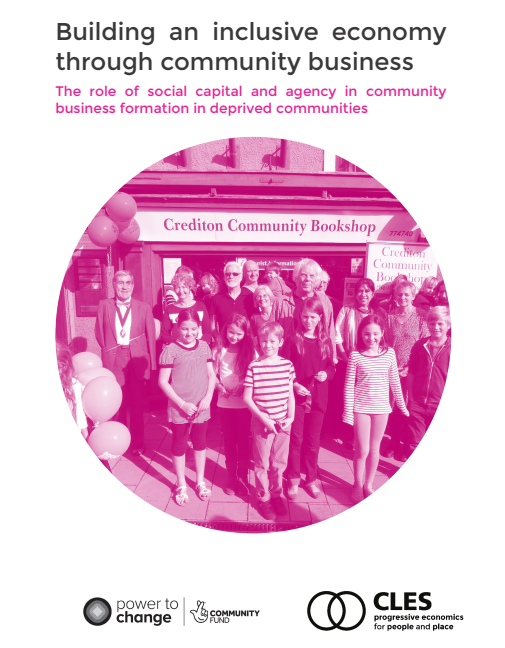How community businesses can help build an inclusive economy
Posted on 22 Oct 2019 Categories: Local initiatives, News, Reports, The business we want, The society we want, Community Wealth Building

A new report from the Centre for Local Economic Strategies (CLES) and Power to Change, Building an inclusive economy through community business, ‘explores how community businesses can support the development of a more inclusive economy in deprived communities’.
The report begins with the Institute of Fiscal Studies’ prediction that ‘inequality will continue to rise over the next five years’, which ‘raises concerns that those who already have little opportunity to participate in the economy are getting left further behind’. Research already done by Power to Change shows that community businesses – defined as ‘local enterprises that trade for the benefit of the local community’ – have the potential to reduce inequality and social exclusion. The report seeks to answer three questions:
‘1. Why do community businesses grow/thrive in some deprived areas and not others?
2. Where community businesses do operate in deprived areas, to what extent are these initiated by, or empowering for, people living in poverty?
3. What are the critical factors that allow community businesses to contribute to a more inclusive economy and how should support be shaped to encourage a more inclusive economy in the future?’
The report sets out the conditions for the formation of a thriving community business: social capital and agency. Social capital can be broken down into bonding capital, ‘ties between individuals within the same social group’, bridging capital, ‘ties between individuals which cross social divides or between social groups’, and linking capital, ‘networks of trusting relationships between people who are interacting across … power gradients in society’. The theory set out in the report states that when
‘social capital and agency conditions empower a community to build local responses to social challenges, community business models are more likely to thrive and contribute to a more inclusive economy’.
The study explores ‘three deprived communities … which vary by the extent to which community business is flourishing’: south Liverpool, described as a ‘community business hot spot’, West Hull, which is ‘warming up’, and north Smethwick, which is ‘starting out’. The study examines each area’s history and the impact it has on ‘relationships of trust, norms of cooperation and reciprocity’ and shows how a community’s ability to tackle structural inequality is ‘shaped by relationships within and between groups’.
It goes on to set out a series of recommendations. First, it calls for community business champions, such as existing community businesses or local anchor institutions. They can ‘act as a resource to enable social action and encourage community business solutions’, help identify how deficits in social capital may be inhibiting social action, and help provide ‘mentors to build skills, bridge connections between groups within a community and build localised networks’. It also recommends building on its initial exploration of the link between agency and social capital, through further research exploring ‘the role community businesses play in developing more active citizens’. Finally, it advocates ‘aligning with the community wealth building movement’ and recognising ‘how community business models contribute to the principles of community wealth building’.
Read the full report here.
Posted on 22 Oct 2019 Categories: Local initiatives, News, Reports, The business we want, The society we want, Community Wealth Building
